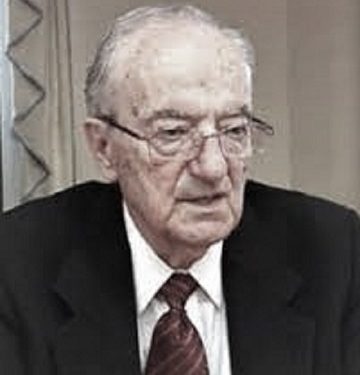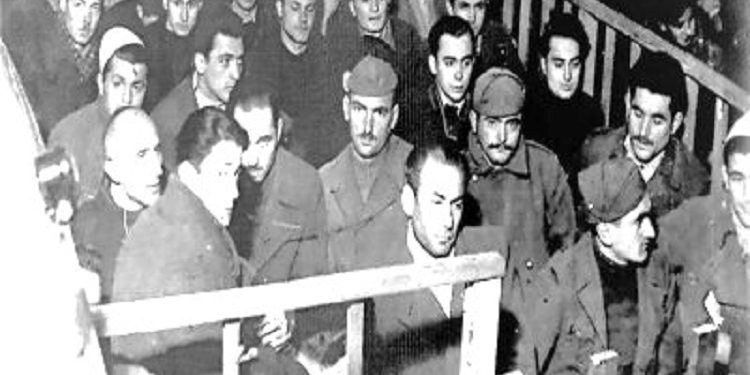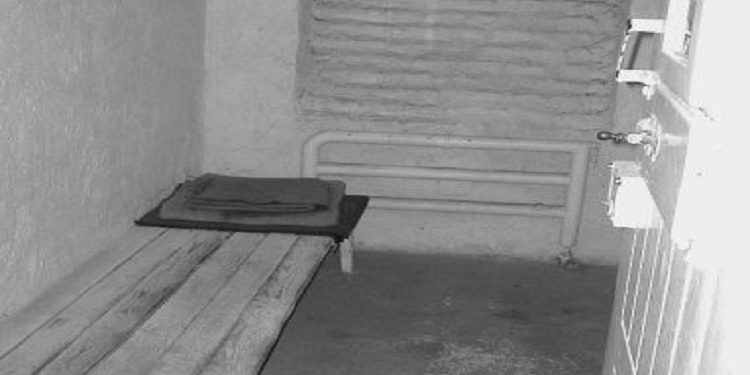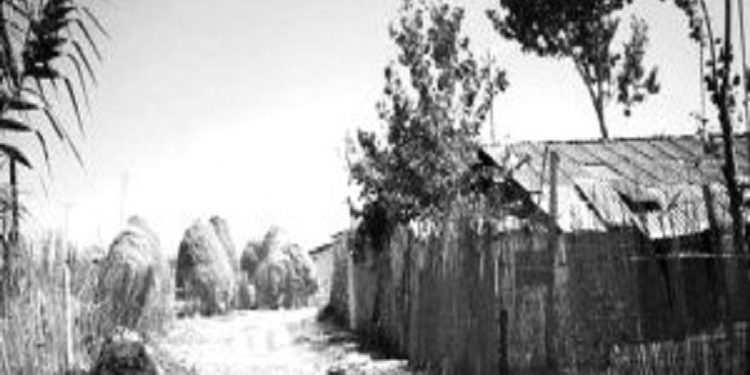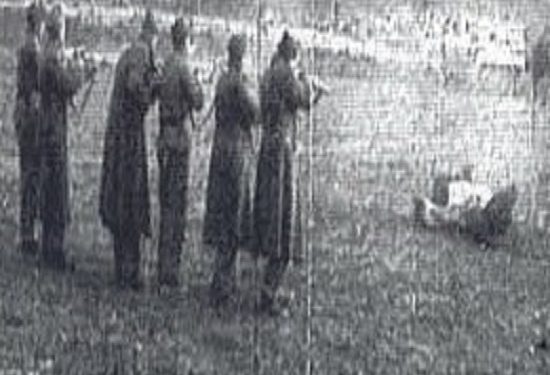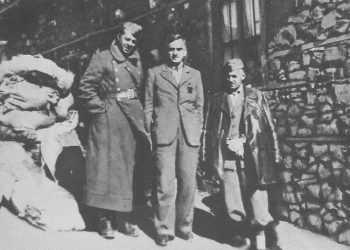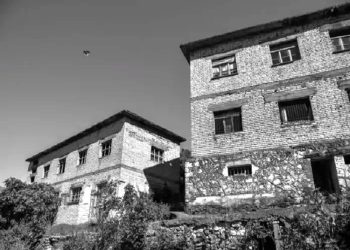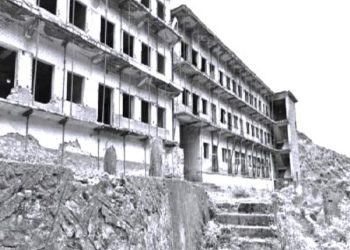From Assoc. Prof. Dr. Thanas L. Gjika
Part Five
(Portrait-biography dedicated to the prominent activist, Professor Sami Repishti)
Memorie.al / Sami Repishti is one of those afflicted individuals who, after enduring torture during investigations, the suffering of prison, the danger of escape, and persistent work to qualify and serve the homeland as anti-communists, deserve to be called, while still alive, heroes of the Albanian world. He, along with Arshi Pipa and Martin Camaj, forms an elite trio of Shkodra natives who, through their lives and work, carried forward the patriotic and intellectual mission of the National Renaissance and the patriots of the Second World War and beyond. For more than half a century, Professor Repishti, through his diverse work in defense of the rights of Albanians wherever they live, with his memoranda, political articles, analyses, essays, literary creations, speeches at conferences, interviews on “Voice of America” (VOA), his work as a co-founder of several patriotic organizations and associations, as well as his concrete actions in the homeland and in Kosovo to closely assist the processes of democratization and the creation of a rule of law, deserves to be called a self-standing Institution.
Continued from the previous issue
The Trial of Communist Crimes is Delayed, But It Will Happen
Sami Repishti and many prominent analysts of today’s Albanian society have expressed the conviction that the trial against the crimes of Albanian communism, however much it may be delayed, will definitely take place.
Even today, more than 35 years after the capitulation of the communist dictatorship, the majority of former officials (of Party Committees, Executive Committees, investigative bodies, prisons, internment camps, etc.), as well as the majority of artists and writers who created works of socialist realism, along with the majority of former social science researchers, are not seeking forgiveness for their deeds.
This entire group, along with their children, continues to justify themselves with the phrases; “that was how the time was, those were the laws,” even though the damages caused to our people by the communist rule through class warfare, isolation, impoverishment, etc., in many areas such as morality, literary-cultural heritage, economy, and international politics, have become clear.
Not accepting the fact that you walked the wrong path, that you harmed your people by serving the communist dictatorial system, means that you are defending old crimes and committing new ones. However, as the analyst Astrit Lulushi has pointed out: one day, however distant, with the return of our society to reality, the judgment of the past will also be demanded. (Sporadic Disappointments, ‘TIRANA TIMES’ 2012, p. 480).
Professor Repishti is convinced that the time for the trial to condemn the crimes of communism will come, no matter how much the rulers of Albania might delay it. Precisely for this, he has written several articles in various newspapers. The article “From Germany – A Civilization that Honors!” was published in several newspapers, and the Institute for the Study of Communist Crimes and Consequences republished it along with other articles by this author in the book “From Youthful Dreams to the World of Deception,” (Tirana 2016, pp. 193 – 198).
The author was prompted by the visit of the German citizen Marcus Burger, the son of a Nazi, to Borovë of Kolonja, to participate in the ceremony of the 70th anniversary of the commemoration of the massacre committed by the German army on July 6, 1943, when they burned houses and killed the residents of the village, because partisan forces had attacked the German motorcade passing from Korça to Përmet.
Mr. Burger apologized to the participants of the ceremony for his father’s participation in that massacre. Furthermore, after emphasizing that we should not forget the past, he requested: “today together, as European citizens, let us build the bridges of friendship that are necessary for our future and that of our children.”
Starting from this statement, the article writer Repishti hailed the act of this German citizen and stressed that he found and condemned his father’s responsibility, and went to Albania to apologize. To awaken the consciousness of how far Albanian former participants in the crimes of the communist dictatorship are, who cannot bring themselves to apologize to their victims, he concludes: “We lack civilization in these lands!” (p. 194)
To take the criticism against former communist persecutors further, the author continues with a memory from his life at the Sorbonne University in 1970 – 1971. His friend, a German co-ed, told him that she had abandoned her father, a former high-ranking civil servant during the Nazi regime.
She clarified that her father had not been a member of the National Socialist Party, nor in the service of the Nazi Secret Police, but he was making excuses for what had happened before his eyes. And precisely this self-justification of his had revolted the girl and pushed her to take her suitcase and leave home, because she could not live under the same roof with a person who did not condemn the crimes of Nazism, even though this was her father.
“That day,” the author concludes, “I properly understood the high degree of de-Nazification in Germany…”! In Albania… neither the crime nor the criminal have been brought before the law. No educational measure has been undertaken to bring the shocking truth to light, and to re-educate the Albanian youth with the spirit of responsibility towards society and the necessity of a rule of law (p. 196).
Albanian society and state, the author continues, should take an example from the process of de-Nazification in Germany and value the victims of the communist dictatorship the same way as the martyrs who fell in the fight against fascism and Nazism, to see and evaluate them as the moral capital of democratic Albanian society (p. 197).
In another article, he wrote about the trial of the 93-year-old Nazi Oskar Gruening, who had worked as an accountant in the Auschwitz camp in 1944.
This old Nazi was convicted as an accessory to murder, because during his life, from 1944 until the day of the trial, when he revealed the fact of the extermination of 300,000 Jews in the camp where he worked as an accountant, he did not express remorse and condemnation of the crime, but justified it with the words; “that’s how life was in the Nazi camps.” Thus, he was convicted for not testifying to the terror he saw with his own eyes even though he had not personally participated in the extermination of the victims.
“He did this out of shame, out of the weight of guilt, out of fear of punishment,” Repishti explains, implying the Albanian participants in the crimes of communism, who continue to justify themselves and do not take a critical stance toward their actions of that time. (‘Illyria’, NY, April 10, 2015).
And we can imagine how all those who caused the massacre of our people under the communist dictatorship will be judged by the judges and by their own conscious grandchildren, not only in investigations, trials, prisons, and internment camps, but also in literary, artistic, and scientific works where they distorted reality and traditional morality.
The comfortable life in America has not dulled Repishti’s passion for actively participating in the processes of the Albanian society confronting its communist past.
Thus, on November 17, 2017, when the second edition of the ‘Days of Remembrance’ was organized in Tirana by the Institute for Democracy, Media and Culture (IDMC) and the German Foundation Konrad Adenauer, Professor Repishti participated by sending his letter, which was read at the ceremony by his niece, Ardita Repishti – Shehu.
There, the German expert Hildigund Neubert, former commissioner for the opening of the STASI files in East Germany, emphasized that one of the evils of the communist system was and continues to be the falsification of history, therefore remembrance is the so-called anti-venom for healing the trauma that the dictatorial secret services had caused to social consciousness.
Professor Repishti stressed in his letter that; the problem that has left our people still severely wounded by indescribable suffering endured during the years of communist terror is indifference.
He then conveyed the message of the late Archbishop Imzot Rrok Mirdita: “…even for Albania and the Albanians, there will be no sound foundation for national progress, as long as there is no bold purification process of historical consciousness; an individual and collective awareness of Albanians, of their identity as a people and as an organized unit in an independent state…”!
Further in his letter he emphasized: “How can we accept that even today criminals recall the regime of crime with nostalgia, and continue the condemnation of those they self-proclaimed as victims, defend their criminal act or that of their parents, and who today support political movements that want the return of the regime of ‘club and rope’ and justify it with the phrase that; ‘time’… erases our memory partially today, and for future generations, totally”?!
Nevertheless, one thing is certain: none of “those” who helped voluntarily – or were forced to obey – will be able to “shake off” the responsibility for their stance during the 45-year period of terror organized with scientific means. Even if they are not “guilty,” he/she should feel ashamed…!
The victims of communist persecutions must stay away from these miserable elements that have lost their humanity, their natural solidarity with human beings in difficult days. This was the case with the fascists, with the Nazis, and this is also the case for the communists. We must not forget!…
No one has the right to forgive in the name of the victim, when he/she has not suffered on their back the horrors of torture, which cannot be endured and which cannot be “forgotten”…!
Today, we must fight “forgetfulness,” because we are convinced that silence represents the greatest danger of the repetition of the past horror….!
The victims of the red terror found enough courage to despise hatred and its offspring, revenge. With this stance, they have ennobled their beings and have given an excellent example to the history of our people. This sublime gesture remained unanswered! What a pity!…
The importance of judging and condemning such faults is indisputable. We must not forget this, because “forgetfulness” makes the repetition of the past possible, by deformed minds and opponents of democracy in our country. We must speak; we must show and describe the communist hell by all means, but without violence. Violence is not our weapon; justice is!
Today, we face the second phase of the moral reconstruction of our life in Albania. In the first phase, we scorned hatred and revenge. Today, we hope that it will be possible to take the second step: reconciliation among us. Because even we, the victims, need our lost peace.
How can we reach this very difficult point? Perhaps… if we are convinced that “reconciliation” will bring back the human element (essence) to us, to all of us, as well as our ethical values.
I… live troubled, I do not forget, and I will continue to “remember” the communist crime until the end. In 2014, the former interrogator and torturer of Father Zef Pëllumbi and Sami Repishti, Shyqyri Çoku, were honored with the “Veteran of the National Liberation War” Medal. Many persecuted individuals complained, and Prime Minister Edi Rama apologized after a year, saying that the Ministry of Defense had merely performed a mechanical action. Professor Repishti then intervened: “If the crime is not denounced, the apology is not sincere. The failure to seek forgiveness and the lack of denunciation of the crime by the perpetrators is a second Albanian tragedy,” stressed the honored Professor from America, which was also reproduced by the newspaper ‘Illyria’ NY, 12. 16. 2015.
Not simply to conclude this portrait without any comment, but I believe I am genuinely right to point out the fact that the Institution of Repishti has excelled and continues to excel in the fight for human rights, in the struggle for the freedom of Kosovo, and in the fight against the crimes of communism, but he has left aside the fight against the Ottomanist aims of Erdogan and the chauvinistic efforts of some Greek circles and officials towards the Albanian people and Albania, aspects that are not insignificant harmful to us.
During the correspondence of those days when I was writing this biographical portrait, I wrote to the professor: “Dear Professor Repishti, in the interview you gave to Mr. Dalip Greca at ‘Dielli’ last year, you said that your life full of suffering pushed you to dedicate yourself to the fight for human rights and that this fight helped you reach ‘the conclusion that bringing a smile to the face of a suffering person is the great success in life; and, breaking the heart of an innocent being is the complete failure in life! Such a conclusion brings you closer to holy people like Mother Teresa. May I ask you, whether you have made mistakes during your life or not, as ordinary people do?’ Professor Repishti replied: ‘I, like everyone else, am not infallible, but regarding political and moral principles, I believe I have not made a mistake. If someone thinks otherwise, let them point it out, and I welcome it.’
Some conclusions;
Professor Sami Repishti is a complete personality of a pedagogue, researcher, writer, and Albanian-American politician. He is a multi-dimensional figure of Albanian and American culture, literature, science, and patriotic political activity.
When his life and complete work are studied, it will be seen that his writings and actions are distinguished by their anti-communist content expressed with wisdom, and for their critical stance towards violations of laws and rules approved by governmental or organizational instances.
It will also be seen that his maturity and humanism are of a rare level, constituting a great asset in several areas of our political, cultural, literary, sociological heritage, etc.
His writings on the condemnation of communist crimes teach us that the remembrance and condemnation of these crimes should not be done rarely and as a token, but as often as possible until the conscience of the Albanian people becomes sensitive to this wound and evaluates and condemns it properly, just as the German people have condemned and continue to condemn the Nazi crime.
The condemnation of communist crimes, in a way, should be understood as a measuring gauge to understand whether we are ready to join the community of European nations.
Rightly, the sharp journalist, Ruben Avxhiu, in evaluating Professor Repishti, emphasized: “Albanians must learn to support a politician without adoring him and to oppose and overthrow another politician without hating and dehumanizing him.
The greatest merit of Professor Sami Repishti, in his contributions to Albanian public life in these years, has been precisely his sober tone in relation to Albanian political leaders. For this, he has often paid the price that comes with the effort to calm the enthusiastic militant who refuses to see any color other than that of his party.
In so few years of democracy, the honored professor has seen for himself how easily the masks of politeness fall when the taboo of politics is touched. He has gone from accusations of being a servant of the enemies of the communist regime to accusations of being a servant of the regime that persecuted him. Former communists accusing former persecuted people as ‘communists’ is in fact the most interesting symptom of the Albanian political and historical schizophrenia. Professor Sami Repishti has done his utmost to leave his written thoughts and judgments for the reader of yesterday, today, and tomorrow. But, people like him deservedly enjoy the respect of generations, precisely for the calmness, maturity, and moderation that characterize their contribution to society.**
Knowledge and capacity do not necessarily bring wisdom. Many extreme militants are, in the end, very educated or intelligent. Wisdom and prudence are not learned in books, they are educated by the words and stances of people like Sami Repishti.
His contained experience of the great changes, his choice to focus on the lessons of history and not on personal triumph, his care that evil should not be repeated, his sober criticism of the heroes of the new era, are important gifts for present and future generations. In the future cycles of history, these perspectives will be greatly needed, and for them we particularly thank this great witness of changing times today.” (Ruben Avxhiu, Sami Repishti for all times, ‘Illyria’, NY, 7. 20. 2015)
The current assessments for this personality of our world by the democratic Albanian governments with several decorations and the appreciation by the President of Kosovo Ibrahim Rugova, with the “Golden Medal of the League of Prizren,” I think are insufficient. They are insufficient, because for this brilliant mind, the publication of his selected works should be prepared by specialists with the encouragement of the Ministries of Culture and Education of Albania and Kosovo.
And finally, I suggest, as the poet and researcher Anton Çefa suggested four years ago, that Professor Sami Repishti should be given the “ORDER OF HONOR OF THE NATION,” because this gesture does not simply honor this distinguished activist, but the entire Albanian society…! / Memorie.al




